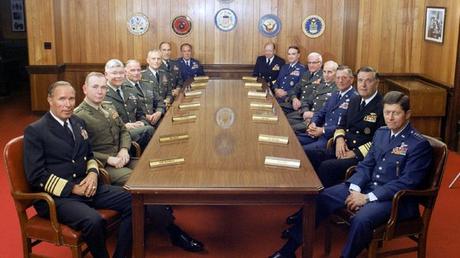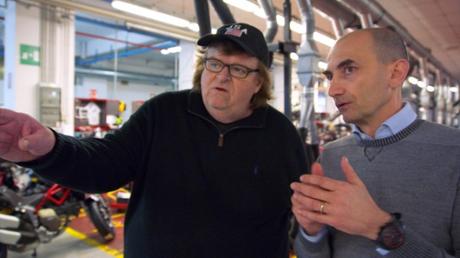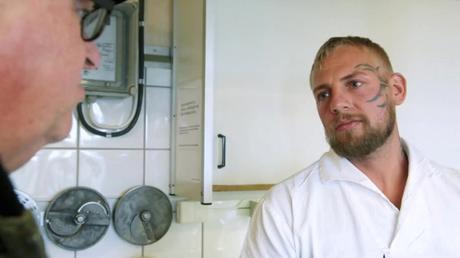Sarcastic, Hilarious, Educational And As Always, (Almost) Guaranteed To Make You Feel Shitty About The System That Exists In United States. “WHERE TO INVADE NEXT” finds Moore traveling to foreign countries, mainly in Europe, to claim their best civic ideas for America.

As I walked in at this evening’s screening, I wondered if the new Michael Moore film was an anti-war message, or whether it was an indictment of America’s defense policies. Michael Moore had taken them on already in the Cannes Palme d’Or winning Fahrenheit 9/11 back in 2004. He also took on the American healthcare system with his Oscar nominated film Sicko in 2007. He even took on gun violence and America’s obsession with guns back in 2002 with the Oscar & Cannes Palme d’Or winning film Bowling For Columbine
His groundbreaking film ofcourse was the 1990 film Roger & Me, a statement on corporate greed targeting General Motors and how it bankrupted and destroyed his beloved home town of Flint, Michigan, a town in the news again about its suffering a massive drinking water contamination crisis (the film was now used as subject material for many business school courses, including mine).

This time around in the new film WHERE TO INVADE NEXT, Michael Moore trains his inimitable style of sarcasm and hilarious storytelling on the American education system, the American penal system, the deep social inequality and how America created a system built on white-washing our past history to showcase itself as the model system of national governance and economic management to the world, all at once. Now in his 60s, Moore has, in fact, transformed into a self-described “crazy optimist.”
To learn what the USA can learn from other nations, this time Michael Moore assumes the role of a self-appointed globetrotting “invader” on behalf of a much-troubled America to see what they have to offer. All that was missing was a cameo appearance by Bernie Sanders.

Moore visits Italy to learn about how Italian companies allow their workers enjoys vacation days and worker pay that would unimaginable here, yet enjoys higher worker morale, productivity and prosperity that their American counterparts. Interesting visits to Ducati’s factory and interviews assembly line workers, and those at a high-fashion apparel house.

This image provided by Dog Eat Dog Films shows director Michael Moore, left, and Claudio Domenicali, CEO of Ducati, in a scene from his documentary, “Where to Invade Next.” The movie opens in U.S. theaters on Feb. 12, 2016. (Dog Eat Dog Films via AP)
In France Moore takes us on a visit to the public school system, the teaching system, the healthier school lunches served in French schools and best of their no-homework policy.
In Slovenia, where a college education is free, he talks with American students and teachers who left America and moved here. They highlight why this system works better than America’s college system designed to load students with a lifelong burden of debt. He even gets a 45-minute private meeting with Borut Pahor, the sitting President of Slovenia.
In Germany we visit Faber-Castell, the famed maker of specialized pencils and drawing tools for schools and design work. In a digital age where use of paper is fast being replaced by the computer screen, Faber Castell has had its best year ever in productivity and worker morale.
Next we visit Portugal and meet with their head of drugs enforcement agency to understand why the country has the lowest incidence of drug-related offenses in a society that has decriminalized every kind of drug well beyond marijuana.
It’s the prison part of the film that proves to be especially insightful, with Moore learning that most developed countries outside of North America view prison as a means of rehabilitation rather than pure punishment. Norway becomes his argument about a model penal system works and how its humane treatment of prisoners focus on human dignity and reformation and brings social benefits. He takes us inside two different prisons and chats with prisoners who live like free people, and administrative staff carries no weapons. Dehumanization is something that’s simply not acceptable in places like a Norweigian super-max prison where inmates start their sentence by watching a pop sing-along music video cover of “We Are the World” made by the guards

As for Tunisia, the country that touched off the Arab Spring, Moore finds democratic passion not only still thriving there but actually achieving worthwhile results. On his only non-European stopover, Moore also takes time to interview a Tunisian activist who cannot understand why Americans know so little about the rest of the world, when the rest of the world knows so much about them. Tunisia where government funded healthcare services for women works better than most advanced countries. It was amazing to observe how women power and public opinion brought down a dictatorship and replaced with a deeply conservative Islamic government which also was forced to give in to changes in its anti-women policies.

Perhaps the most incisive and insightful segment was his visit Iceland where he shows how a country that was almost destroyed by the economic fallout from the 2008 mortgage crisis clawed its way back to health and became prosperous again.We also discover an educational system that not only turned itself around from being one of the worst in the world to being quite possibly the best, but also one that includes such foreign-to-the-U.S. novelties as shorter school days, minimal homework, and no private schools, thus forcing rich and poor to inhabit the same spaces. Its also a country that has served a s a model for women-led politics and business. In feminist Iceland, even more fascinating than the fact that the nation elected one of the world’s first female president, Vigdís Finnbogadóttir, in 1980, is that the one bank that didn’t fall during their recent financial crisis had three women as part of its board of directors, thus leading to a discussion on how having more women in power led to diversity in views and leading to less risky business behavior.

Whether it’s serving tasty and nutritious school lunches or offering quality college education for free, these countries have found a way to do something meaningful. There are hilarious shot of the Italian couple’s astonishment when they’re told that Americans have no legally required paid vacation, or a quote from the French chef about how he’s never eaten a hamburger. The results might seem Utopian but in fact are based on practical realities.
Many of the ideas on display here seem relatively easy for the U.S. to implement, as Moore states earlier on, with the catch being that income taxes would have to increase for the wealthy. However, he makes the point that with things like medicare, free tuition, more vacation-time and more, citizens would actually wind-up wasting far less of their income on things that are considered a human right in places like Italy, Norway, France and more.
The final message of the film highlights the irony that most of the ideas he had been searching for Moore’s films have originally been American ideas. All the game-changing notions of other nations, the film notes in a wry postscript, began in the U.S. His big reveal is that Americans used to be much more caring toward one another, and that was reflected in the values we championed and the politics we practiced. How Did We Lose Ourselves? How Do We Get The Magic Back?
Michael Moore’s been among the most lucrative documentaries at the box office. His “Fahrenheit 9/11” earned $119.2 million in 2004; his last film, 2009’s “Capitalism: A Love Story,” made $14.4 million.
